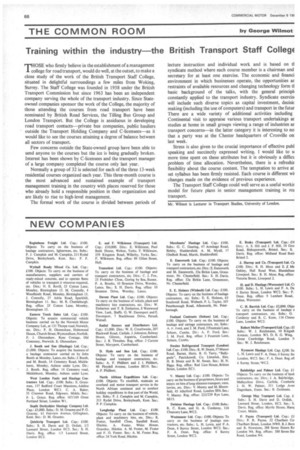Training within the industry the British Transport Staff CollegE
Page 68

If you've noticed an error in this article please click here to report it so we can fix it.
OSE who firmly believe in the establishment of a management college for road transport, would do well, at the outset, to make a close study of the work of the British Transport Staff College, situated in delightful surroundings a few miles from Woking, Surrey. The Staff College was founded in 1958 under the British Transport Commission but since 1963 has been an independent company serving the whole of the transport industry. Since Stateowned companies sponsor the work of the College, the majority of those attending the courses from road transport have been nominated by British Road Services, the Tilling Bus Group and London Transport. But the College is assiduous in developing road transport contacts-private bus companies, Public hauliers outside the Transport Holding Company and C-licensees-as it would like to see the courses attaining a degree of balance between all sectors of transport.
Few concerns outside the State-owned group have been able to send anyone to the courses but the ice is being gradually broken. Interest has been shown by C-licensees and the transport manager of a large company completed the course only last year. "
Normally a group of 32 is selected for each of the three 13-week residential courses organized each year. This three-month course is the most advanced and sustained example of transport management training in the country with places reserved for those who already hold a responsible position in their organization and are likely to rise to high-level management.
The formal work of the course is divided between periods of lecture instruction and individual work and is based on tl syndicate method where each course member is a chairman and secretary for at least one exercise. The economic and financi environment in which businesses operate, the opportunities ar restraints of available resources and changing technology form tl basic background of the talks, with the general principlo constantly applied to the transport industry. Syndicate exercisi will include such diverse topics as capital investment, decisix making (including the use of computers) and transport in the futur There are a wide variety of additional activities including Continental visit to appraise various transport undertakings at studies at home in small groups viewing a range of industries ar transport concerns-in the latter category it is interesting to no that a party was at the Chester headquarters of Crosville on last week.
Stress is also given to the crucial importance of effective publ speaking and succinctly expressed writing. I would like to sl more time spent on these attributes but it is obviously a diffict problem of time allocation. Nevertheless, there is a refreshix flexibility about the course content. The temptation to arrive at set syllabus has been firmly resisted. Each course is different wii changes made on the evidence of previous experience.
The Transport Staff College could well serve as a useful workir model for future plans in senior management training in rol transport.












































































































